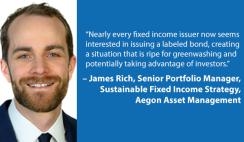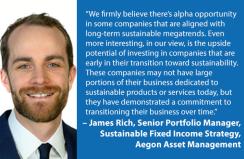Green bond issuance is soaring, but so too are the social and sustainability bond markets – along with the risk of greenwashing. II recently spoke with James Rich, Senior Portfolio Manager, Sustainable Fixed Income Strategy, Aegon Asset Management, about the potential in labeled bonds – and in sustainable investing well beyond them. Rich led the establishment of the sustainability framework that Aegon AM uses to set its eligible investment universe, and his passion for sustainable investing is matched by his knowledge and insights for investors on the topic.
Is green bond issuance still on an upward trajectory?
James Rich: Issuance in the so-called “labeled” bond market – which includes green, social and sustainability bonds – has accelerated in recent years. Green bond issuance has increased sixfold over the last five years. In 2020, global green bond issuance totaled $226 billion, up from about $39 billion at the end of 2015.
That’s an impressive stat. What’s fueling demand?
Rich: Anything “sustainable” within a fixed income context is off the charts right now. The opportunity to earn a market rate of return by aligning with sustainable initiatives and long-term trends towards a sustainable global economy – and that could have a positive impact on the world – is extremely appealing to many investors.
Is supply keeping up with demand?
Rich: At the moment, demand appears to be outstripping supply. Within the investment grade corporate bond market, we estimate that labeled bonds have recently traded about five basis points tighter than a plain vanilla bond issued by the same company with a similar duration. While this premium – or “greenium” – may vary across issuers and sectors, we anticipate it will eventually close as the supply of labeled bonds continues to grow to meet investor demand. Looking forward, we think there will be continued supply coming to market to match elevated demand.

Is the spread differential between labeled and plain vanilla bonds from the same issuer justified?
Rich: No. Ultimately, that premium should collapse to zero because investors are taking the same credit risk. The only difference is whether the investor is specifically supporting the business to move toward greater sustainability. What that means is nearly every fixed income issuer now seems interested in issuing a labeled bond, creating a situation that is ripe for greenwashing and potentially taking advantage of investors. However, the growth in labeled bonds is nonetheless emblematic of issuers’ growing desire to fund sustainability-focused projects and investors’ growing interest in sustainable investing opportunities within fixed income.
And are they finding other ways beyond green bonds?
Rich: More recently we’re seeing the social bond market and sustainability bond market expand. I think the most interesting is actually the sustainability bond market, which combines the green bond and a social bond into one bond. In other words, the proceeds aren’t solely used for green goals – you’re not just investing in clean energy, but also a social element, such as providing affordable housing or reducing the cost of financing for certain income groups. That’s where the market is headed, I think. As evidence, a leading U.S. technology firm issued the largest sustainability bond ever in 2020. For an issuer of that size and prominence to participate in the sustainability bond market says a lot about where companies, labeled bonds, and the asset management industry are headed.
Beyond labeled bonds, a much larger opportunity also exists in looking at the products and services of a company, the characteristics of the business, and the momentum and commitment to making the transition to sustainability. It’s great when a company issues a green or social or sustainability bond, but that’s not the entirety of the sustainable picture for issuers. When we want additional ideas, we look at the issuer itself.
The idea of sustainable investing as source of alpha in fixed income is intriguing. Is there more untapped potential than investors might realize?
Rich: We believe there is an ongoing secular shift toward a more sustainable global economy. It’s not just the younger generations driving it, as is widely believed – 66% of all consumers are more interested in purchasing a product they believe is sustainable than one that is unsustainable according to a study by Nielsen. Consumers are willing to pay a premium for sustainability, and that can be reflected in government policies and influence corporate strategy. When consumers demand it, and policymakers respond, businesses have no choice but to adapt if they want to be successful. Investors with a long time horizon – and that is most institutions – should be taking into account that entire industries are changing to respond to this consumer and policy shift. Think about the auto sector. Consumers are interested in buying electric vehicles or those that run on alternative fuels. Let’s dig a little deeper, though: the largest auto market in the world is China. Regulations in China are forcing a carbon reduction of 50% in auto emissions by 2025 relative to 2015. That is an enormous number that can only be addressed by electric/hybrid vehicles or the use of advanced biofuels, and auto makers are responding. Automobiles are a big sector in a fixed income context, and there will be winners and losers. Investors don’t want to be on the wrong side of that change.
How does that translate into potential alpha for fixed income investors?
Rich: If you’re a long-term investor, we firmly believe there’s alpha opportunity in some companies that are aligned with long-term sustainable megatrends. Even more interesting, in our view, is the upside potential of investing in companies that are early in their transition toward sustainability. These companies may not have large portions of their business dedicated to sustainable products or services today, but they have demonstrated a commitment to transitioning their business over time. By investing in these sustainable “improvers” – as we like to call them – we expect investors can benefit from potential spread tightening as these issuers de-risk their business and become sustainable leaders in the future. On the flip side, companies that are leaders in sustainability today can provide some stability in a fixed income portfolio. We witnessed this in March of 2020 as issuers viewed as leaders provided some downside protection in volatile markets. That’s why we believe a combination of sustainable leaders and improvers may provide an attractive risk-reward profile in a sustainability-themed fixed income portfolio.

As mentioned earlier, there are a lot of green and other labeled bonds available to investors today. How do you identify which are the most compelling and which to include in your strategies?
Rich: We use a five-point framework to evaluate labeled bonds – use of proceeds, governance, any independent frameworks that issuers are using, reporting, and alignment. We start with scrutinizing what the money will be used for – does the issue identify exactly how they’ll use it? Is it truly environmentally friendly or whatever it claims to be? Is it on the right side of a given trend?
The second point is governance. What internal frameworks have issuers put around the decision of how the proceeds will be used? Is there a specific committee? Are they of sufficient seniority to have the CEO’s attention, or perhaps the CEO is even on the committee? Next, are they using an established framework for issuance? ICMA’s [International Capital Market Association] Green Bond Principles have become the standard for labeled bonds, and we view them as a strong, independent framework.
Reporting is next. If it’s a new labeled bond issuer, how strong is the proposed reporting mechanism. If it’s one that’s already been in the labeled bond market, investors can look at existing reporting to see if it’s as promised and also relevant to the targeted projects. In short, is it real and relevant information? The last point is alignment with a broader sustainability plan or transition plan for the business. Is this particular bond issuance aligned with that broader strategy? If they don’t have a broader framework and an issuance is a one-off, it’s possibly an attempt to take advantage of investors – which is a major problem in the green bond industry.
And that kind of greenwashing is why you have the proprietary approach you just described, right?
Rich: Exactly. Avoiding greenwashing and identifying truly credible green bonds requires a comprehensive framework. Further, when assessing any sustainable investment candidates, it is critical to form your own view. Yes, third-party research serves an important role and can help with initial screening and analysis, but just like we form our own credit views, we think it’s essential to form our own proprietary view of an issuer’s sustainability profile.
Have you seen sustainable investing evolve in Aegon Asset Management’s work with its clients?
Rich: Without a doubt. Responsible investing broadly – including ESG integration, active ownership, and focused responsible investment products – has evolved tremendously in recent years. In a sense, it seems Covid-19 has accelerated this shift as related social issues have come to the forefront. The focus on climate change also persists as investors look to mitigate systemic risk in their portfolios. Although sophistication and adoption vary across our client base, nearly every client expects asset managers to integrate ESG factors across their investment strategies, as we do.
Beyond standard ESG integration, which we just view as business as usual, many clients and consultants are searching for focused responsible investment products – solutions that pursue competitive financial returns by focusing on ESG or sustainability criteria. That’s why we developed a range of focused responsible investment solutions that go beyond standard ESG integration. These solutions span four key categories: exclusionary, best-in-class ESG, sustainability-themed, and impact investments.
One of the key goals across all four types of solutions is competitive financial returns. Whether an investor is giving up returns with sustainable investing is the question many were asking five or 10 years ago. Today the question investors should ask asset managers is almost the opposite: How are your sustainable fixed income strategies generating alpha and additional upside while avoiding the downside?
Read more about Aegon AM’s responsible investment approach.
Learn more about opportunities in sustainable fixed income.
Disclosures
This material is for media use only. It contains current opinions of the manager and such opinions are subject to change without notice. Aegon AM US is under no obligation, expressed or implied, to update the material contained herein. This material contains general information only on investment matters; it should not be considered a comprehensive statement on any matter and should not be relied upon as such.
All investments contain risk and may lose value. Responsible investing is qualitative and subjective by nature, and there is no guarantee that the criteria utilized, or judgment exercised by any company of Aegon Asset Management will reflect the beliefs or values of any one particular investor. There is no guarantee that responsible investing products or strategies will produce returns similar to traditional investments.
There is no guarantee that any investment strategy will work under all market conditions or is suitable for all investors. Investors should evaluate their ability to invest over the long-term, especially during periods of increased market volatility. All investments contain risk and may lose value.
This article contains forward-looking statements which are based on the firm's beliefs, as well as on a number of assumptions concerning future events, based on information currently available, and are subject to change without notice. These statements involve certain risks, uncertainties and assumptions which are difficult to predict. Consequently, such statements cannot be guarantees of future performance and actual outcomes and returns may differ materially from statements set forth herein.
Aegon Asset Management US is a US-based SEC registered investment adviser and is also registered as a Commodity Trading Advisor (CTA) with the Commodity Futures Trading Commission (CFTC) and is a member of the National Futures Association (NFA). Aegon Asset Management US is part of Aegon Asset Management, the global investment management brand of the Aegon Group.
©2021 Aegon Asset Management or its affiliates. All rights reserved.





